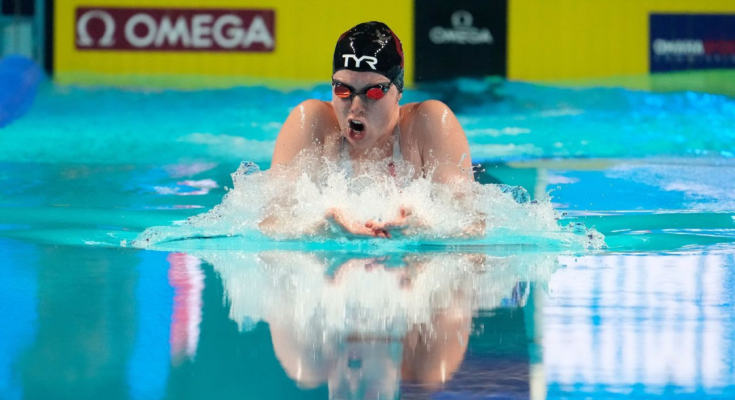TOKYO — American swimmer Lilly King doubled down on criticism of Russian athletes hours after the president of the Russian Olympic Committee said his teams’ medals are the “best answer” to critics who questioned why the country is allowed to compete following doping scandals.
“There are a lot of people here that should not be here,” said King, who won a silver and a bronze medal in Tokyo.
King made her statements seated next to Ryan Murphy, another U.S. swimmer who seemed to take aim this week at a country that has repeatedly run afoul of doping rules.
Murphy later said his comments weren’t aimed at the Russians specifically. King was more direct.
“I wasn’t racing anyone from a country who should have been banned and instead got a slap on the wrist and rebranded their national flag,” she said. “So, I personally wasn’t as affected. But Ryan was.”
Her comments came hours after ROC president Stanislav Pozdnyakov said critics “supposed that as a matter of fact our athletes can’t compete without doping,” but that Russian athletes in Tokyo “proved the opposite not just with words but with their deeds and results.”
Russia was revealed to have launched a massive, state-sponsored program to elude testers ahead of the 2014 Sochi Winter Games. It has sent depleted squads to the last two Olympics as punishment.
The country’s name, flag and anthem have been banned from the Olympics and other major sports events following a legal battle with the World Anti-Doping Agency. After competing under the moniker OAR — Olympic Athletes from Russia — at the 2018 Pyeongchang Winter Games, it has competed as the Russian Olympic Committee (ROC) in Japan.
Russian athletes have won 40 medals in Tokyo, 11 of them gold.
Murphy bemoaned Friday that his races were “probably not clean” after taking the silver medal behind Russian swimmer Evgeny Rylov in the 200-meter backstroke. That came three days after he finished behind Rylov and another Russian, Kliment Kolesnikov, in the 100 back.
He said Saturday the comment wasn’t targeted at Rylov but was instead intended to address suspicions of doping throughout the sport.
“I think things were definitely, they were definitely taken a little bit differently than what the question I was asked intended,” he said. “I was asked a question about doping and swimming and I answered honestly. I do think there’s doping in swimming.”


